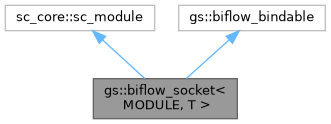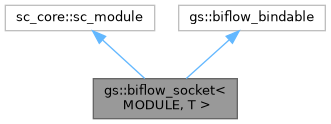

Public Member Functions | |
| void | new_bind (biflow_bindable &other) |
| void | bind_done (void) |
| const char * | name () |
| biflow_socket (sc_core::sc_module_name name) | |
| Construct a new biflow socket object. | |
| tlm::tlm_target_socket< DEFAULT_TLM_BUSWIDTH > & | get_input_socket () |
| tlm::tlm_initiator_socket< DEFAULT_TLM_BUSWIDTH > & | get_output_socket () |
| tlm::tlm_initiator_socket< DEFAULT_TLM_BUSWIDTH > & | get_input_control_socket () |
| tlm::tlm_target_socket< DEFAULT_TLM_BUSWIDTH > & | get_output_control_socket () |
| void | bind (biflow_bindable &other) |
| Bind method to connect two biflow sockets. | |
| void | register_b_transport (MODULE *mod, void(MODULE::*cb)(tlm::tlm_generic_payload &, sc_core::sc_time &)) |
| Register b_transport to be called whenever data is received from the socket. | |
| void | can_receive_more (int i) |
| can_receive_more | |
| void | can_receive_set (int i) |
| can_receive_set | |
| void | can_receive_any () |
| can_receive_any Allow unlimited items to arrive. | |
| void | enqueue (T data) |
| enqueue Enqueue data to be sent (unlimited queue size) NOTE: Thread safe. | |
| void | set_default_txn (tlm::tlm_generic_payload &txn) |
| set_default_txn set transaction parameters (command, address and data_length) | |
| void | force_send (tlm::tlm_generic_payload &txn) |
| force_send force send a transaction | |
| void | reset () |
| reset Clear the current send queue. NOTE: Thread safe. | |
Public Attributes | |
| tlm_utils::simple_target_socket< MODULE, DEFAULT_TLM_BUSWIDTH > | input_socket |
| tlm_utils::simple_initiator_socket< biflow_socket, DEFAULT_TLM_BUSWIDTH > | input_control_socket |
| tlm_utils::simple_initiator_socket< biflow_socket, DEFAULT_TLM_BUSWIDTH > | output_socket |
| tlm_utils::simple_target_socket< biflow_socket, DEFAULT_TLM_BUSWIDTH > | output_control_socket |
Constructor & Destructor Documentation
◆ biflow_socket()
|
inline |
Construct a new biflow socket object.
- Parameters
-
name
Member Function Documentation
◆ bind()
|
inlinevirtual |
Bind method to connect two biflow sockets.
- Template Parameters
-
M
- Parameters
-
other : other socket
Implements gs::biflow_bindable.
◆ bind_done()
|
inlinevirtual |
Implements gs::biflow_bindable.
◆ can_receive_more()
|
inline |
can_receive_more
- Parameters
-
i number of additional items that can now be received.
◆ can_receive_set()
|
inline |
can_receive_set
- Parameters
-
i number of items that can now be received.
Setting this to zero will have the side effect of async_detach_suspending the other ends async_event. Setting this to NON-zero will have the side effect of async_attach_suspending the other ends async_event.
◆ enqueue()
|
inline |
enqueue Enqueue data to be sent (unlimited queue size) NOTE: Thread safe.
- Parameters
-
data
◆ force_send()
|
inline |
force_send force send a transaction
- Parameters
-
txn
◆ get_input_control_socket()
|
inlinevirtual |
Implements gs::biflow_bindable.
◆ get_input_socket()
|
inlinevirtual |
Implements gs::biflow_bindable.
◆ get_output_control_socket()
|
inlinevirtual |
Implements gs::biflow_bindable.
◆ get_output_socket()
|
inlinevirtual |
Implements gs::biflow_bindable.
◆ name()
Implements gs::biflow_bindable.
◆ new_bind()
|
inlinevirtual |
Implements gs::biflow_bindable.
◆ register_b_transport()
|
inline |
Register b_transport to be called whenever data is received from the socket.
NOTE: this strips the 'quantum time' from the normal b_transport as it makes no sense in this case.
- Parameters
-
mod cb
◆ set_default_txn()
|
inline |
set_default_txn set transaction parameters (command, address and data_length)
- Parameters
-
txn
The documentation for this class was generated from the following file:
- systemc-components/common/include/ports/biflow-socket.h